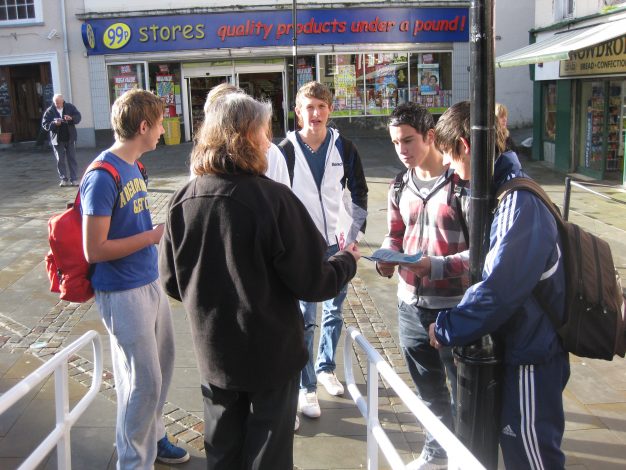
It’s time to lower the voting age to 16
At the UK general election last month, 16 and 17-year olds were yet again denied the right to vote. In this special guest blog Tommy Peto, from the University of Oxford, argues why it’s time to lower the voting age to 16.
In 2014, around 100,000 16 and 17-year-olds cast votes in the Scottish Independence referendum. Yet, in 2016, 16 and 17-year-olds throughout the UK were denied the opportunity to vote in the referendum on the UK’s membership of the European Union – the most significant political decision in a generation, and one which will affect them for the rest of their lives. And last month at the UK general election, 16 and 17 year olds were yet again denied the right to vote.
In the UK, lowering the voting age to 16 for all elections is currently a manifesto pledge for all the main opposition parties; Scotland has a voting age of 16 for its parliamentary elections; and so do the British Crown Dependencies. However, Austria is the only country in Europe to lower the voting age to 16 for all elections, including general elections, doing so in 2007. So, why wouldn’t we lower the voting age?
Political maturity
The main argument against is that 16 and 17-year-olds don’t have the political maturity to engage in elections. Political maturity is standardly made up of: (i) knowledge of the political system and issues that are the subject of public and political debate; (ii) possession of consistent political convictions which are not subject to whimsical change; (iii) willingness to engage in politics. Using data from Austria and Norway, we can see that on each of these measures of political maturity – knowledge, stable preferences, and interests – 16 and 17-year-olds are as mature as older voters. This is because, when the voting age is lowered, lots of teenagers feel they ought to read up on political issues and get involved in politics. It seems , therefore, that, most UK teenagers ignore most politics because most politics ignores most teenagers. But when the political system engages with teenagers, teenagers engage (maturely) with the political system.
Often, the charge is levied that 16 and 17-year-olds ‘just don’t know enough’ about politics to be allowed to vote. However, when the voting age is lowered, tests show any knowledge gap between 16-17-year-olds and adults completely disappears. Indeed, even now in the UK, the average civic knowledge score for 16-year-olds is slightly higher for 19, 21, and 23-year-olds.
Another common worry about votes at 16 is that they don’t really know their own minds, and frequently change their opinions. However, political engagement increased markedly amongst teenagers in the Austrian case, such that voter competence and the quality of 16 and 17-year-olds’ political choices were similar to that of older voters. Their preferences are stable over time, and they vote for the parties that most accurately reflect their general political preferences.
More engaged
A final concern is teenagers are too politically apathetic to vote – they just don’t care. Although this does to a limited extent describe 16 and 17-year-olds in the UK, who are, in general, less interested in politics than their older peers, this changes once 16 and 17-year-olds are given the vote. In Austria and Norway, 16 and 17-year-olds became much more engaged and opinionated when given the vote. In fact, they became more interested in politics than those aged 18-21; have turnout rates about 10-12 percentage points higher than 18 to 23-year-olds; and have turnout rates roughly the same as the national average.
Let’s suppose, however, that many 16 and 17-year-olds are uninterested and ignorant about politics, and would remain so even if we lowered the voting age. Nonetheless, the voting age should be lowered. A number of 16 and 17-year-olds are very politically well-informed and engaged. They vote in youth parliament elections, join political parties, and canvass in elections. They are very politically mature (indeed, perhaps more than certain adults). What could we say to such individuals about why they should be denied the vote? We cannot tell them they are too immature.
We might be able to say that although we would allow the valuable votes of politically mature teenagers to be cast, by lowering the voting age, we would also allow immature teenagers to vote, and the cost of allowing politically immature teenagers to vote would be too high. But what would the cost be? In fact, such costs would be very low. Politically immature teenagers are those who are uninterested in politics and ignorant about politics. But it’s very simple to separate the interested from the uninterested without preventing all young people from voting: we could simply see who actually registers to vote and then who actually turns up to the polling station. After all, if you’re not interested in voting, why bother registering and turning up?
Negligible effect
In fact, those who say they follow government and public affairs ‘hardly at all’ but who nonetheless vote in elections made up under 4% of total votes cast. Politically immature voters, therefore, could only have a negligible effect on political outcomes (if any). Since there is little drawback to granting the vote to apathetic teenagers, and since it’s wrong to withhold it from mature teenagers, we cannot appeal to the politically immaturity of some young people to show that no young people should be given the vote.
The key findings of my research are that, when 16 and 17-year-olds are given the vote, they become as politically mature as older voters. And further, to the extent that some 16 and 17-year-olds are politically immature and will remain so, the negligible harm of letting such teenagers vote fails to outweigh the wrong of denying that right to politically mature teenagers. And that is why the voting age should be lowered to 16.
Tommy Peto
Photo: National Assembly for Wales
This blog first appeared on the Children’s Rights Alliance for England

Votes at 16 is a campaign of young people together with supporting organisations and politicians across the UK, campaigning to give Britain’s 1.5 million 16 and 17-year olds the right to vote’.




